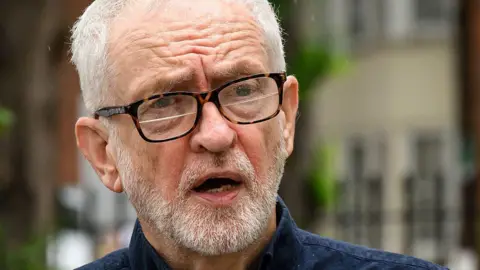In a significant development in British politics, Jeremy Corbyn, the former leader of the Labour Party, has announced his intention to establish a new political party. This bold move is framed by Corbyn as an initiative to “build a democratic movement that can take on the rich and powerful.” Although the party has not yet been officially named, Corbyn, who represents Islington North as a Member of Parliament, aims to position this new entity as a contender in upcoming local elections scheduled for May, as well as in the general election anticipated in four years.
The launch of this new political party could dramatically alter the existing political landscape in the United Kingdom. Analysts suggest that both the Labour Party and the Green Party may be the most vulnerable to losing potential votes to Corbyn’s emerging organization. Poll data from last month indicates that approximately 2,000 participants envision a hypothetical party led by Corbyn securing about 10% of the national vote. This statistic is significant, as it implies that this new party could detract three percentage points from Labour’s vote share—potentially bolstering the lead of the right-wing competition, specifically Reform UK.
Experts in political polling highlight the risks for Labour. Luke Tryl, the UK director of More In Common, emphasizes that should this trend be reflected in an actual election, Labour might face the stark reality of not only losing votes to Corbyn’s faction but also conceding parliamentary seats to parties such as Reform UK or the Conservative Party. Tryl also notes that in a politically fragmented environment, even small shifts in voter allegiance can prove crucial and could influence the formation of the next government. With Labour struggling to maintain a consolidated voter base, Corbyn’s party could certainly disrupt the established dynamic, energized particularly in regions with a strong pro-Palestinian sentiment, like Birmingham and various parts of London.
Moreover, polling also reveals that Corbyn’s prospective party could attract younger voters, particularly those under 26—a demographic that tends to lean towards progressive policies. Inner-city areas populated by students may become vital strongholds for this new political movement. The upcoming local elections in May will present the first significant opportunity for Corbyn’s new party to test its appeal among voters.
Conversely, the Green Party appears poised to face substantial challenges stemming from this political shift. Having already attracted many disenchanted Labour voters, the Greens could lose further support if a left-leaning alternative emerges. The Greens had previously come in second to Labour in 40 constituencies during the last election but are now wary of a potential vote drain, contingent on whether the two parties could form strategic electoral alliances.
For the newly formed party, a critical component will include the four pro-Palestinian MPs who realigned after the last general election, alongside Zarah Sultana, a vocal and key figure in this endeavor. Discussions of cooperation with the Greens have been initiated, with both parties recognizing the strategic benefit of standing down in seats where the other holds a stronger chance of victory.
Yet, the prospect of a formal agreement between the two factions remains uncertain. Corbyn has hinted at a willingness to collaborate, and figures like James Schneider, an ally of Corbyn’s, have expressed optimism regarding a potential pact. Meanwhile, Zack Polanski, an aspiring leader of the Green Party, is open to alliances aimed at countering the advances of Reform UK.
However, disagreements within the Green Party underscore a divide on how closely to align with Corbyn’s party, reflecting concerns from members like Adrian Ramsay, who caution against becoming merely a support act for Corbyn’s agenda, emphasizing the need for the Greens to maintain a distinct identity.
Concurrently, university political science expert Rob Ford articulates that, while Corbyn possesses a level of celebrity and recognition unparalleled in the Green Party, the Greens have an inherent advantage regarding a core environmental focus that may not directly coincide with Corbyn’s platform. As the political landscape increasingly fragments, entities like the Green Party will face pressure to navigate their positioning carefully or risk overshadowing from the newer left-wing challenge.
Recent polling data also underscores an evolving electoral sentiment, illustrating that a notable portion of voters remains receptive to the establishment of a new left-wing party under Corbyn’s leadership. Simultaneously, a considerable faction expresses openness to supporting Reform UK, underscoring the unpredictable terrain of British politics as factions vie for voter support.
In addition, the tumultuous introduction of Corbyn’s new party has been characterized by confusion over leadership and naming, particularly after Sultana’s announcement of plans to collaborate with Corbyn stirred anticipation and uncertainty. Labour insiders have dismissed the new undertaking, citing previous electoral defeats for Corbyn’s ideology during the 2017 and 2019 elections.
Political dynamics within Labour continue to reflect skepticism towards Corbyn’s credibility, echoed by accusations from figures such as Peter Kyle who criticize Corbyn’s intentions as lacking seriousness. On the contrary, Schneider stresses that the actual impact of the new party may not solely depend on the number











